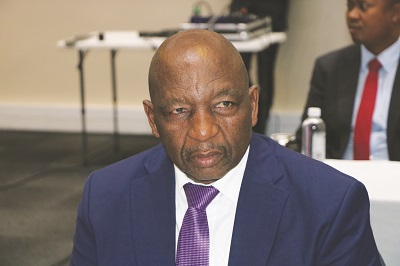By: Mpho Shelile
The Prime Minister of Lesotho, Hon Ntsokoane Matekane, recently held a meeting with block farmers at the Manthabiseng Convention Center to discuss the pressing issue of food production.
During the meeting, Matekane emphasized the need for Lesotho to produce its food instead of importing 70% of its food from South Africa. Adding that the inability of the country to self-sustain has led to hunger and poverty. To address this issue, the government has prioritized agriculture, subsidized farming inputs, and provided a 30% subsidy in financing farm machinery.
This, he said when addressing block farmers at the meeting held in Maseru on Thursday. The meeting aimed at discussing food production and sharing ideas on what the government through the Ministry of Agriculture, Food Security, and Nutrition can do to promote food production as well as to share achievements, and challenges and map the way forward.
Hon. Matekane said a report from the Ministry of Agriculture Food Security and Nutrition indicated that 70 percent of food is imported from South Africa, saying the country has for a long time been faced with a challenge of hunger and poverty and that the inability of Lesotho to provide food for herself tarnishes her image.
“We have the productive land to produce food hence failure to do so makes Lesotho a beggar,” he said.
During the meeting, the Ministry provided farmers with valuable insights into its objectives, achievements, challenges, and priorities. This informative session will empower farmers to make informed decisions that will positively impact their agricultural operations.
He added that in the 2023/2024 financial year, the government prioritized agriculture as it is the backbone of Lesotho’s economy hence the implementation of block and commercial farming.
He noted that the government subsidized farming inputs and provided a 30 percent subsidy in financing farm machinery, urging farmers to work jointly with the Ministry of Agriculture to amongst others analyze subsidy policy, ensure farming inputs are bought on time, make plans together, and inform the ministry when things do not go well.
He further noted that when his government came into power, 222 719 hectares of food grains were being plowed, saying they added 55 hectares in 2023 making a total of 278,000 hectares.
He, therefore, emphasized that they intend to plow 360,000 hectares in the next financial year, 2024\2025.
Hon. Matekane also said the government will soon present budget estimates, the Minister of Agriculture should resume the procurement process for farming inputs immediately after to avoid delays.
Amongst other issues that were raised by farmers during deliberations included; the presentation of irrigation policy, the Ministry’s failure to implement plans and strategies, congestion at resource centers for collection of farming inputs as well as traveling costs to collect them.
One farmer stated that some Companies take advantage of the subsidy provided by the government but fail to sell quality seeds. Reports indicate that 60,000 Basotho are currently experiencing hunger and poverty. Urgent action is needed to address these issues and ensure that Lesotho becomes self-sufficient in food production.
The farmers raised several issues during the discussion, such as the enactment of an irrigation policy, the Ministry’s failure to implement plans and strategies, and congestion at resource centers for the collection of farming inputs. One farmer also warned the Ministry of companies that take advantage of the subsidy provided by the government but fail to sell quality seeds.
Mr. Rethabile Letsapa a farmer stated that reports show that a staggering 60,000 Basotho individuals are currently grappling with the harsh realities of hunger and poverty.
Mr. Letsapa indicated that these numbers are a testament to the dire need of assistance by the government. The lack of basic necessities such as food and clean water leads to deterioration of health and a significant reduction in the quality of life. “We must act quickly and provide immediate support to those in need. Let’s join hands and work towards a brighter future for everyone,” he said.
The Minister of Agriculture and Food Security, Mr. Litšoane Litšoane, issued a cautionary warning to the government about certain companies that exploit government subsidies while failing to provide quality seeds. The warning comes in response to a growing concern over the quality of seeds that are being sold by such companies. Mr. Litšoane emphasizes the need for the government to take strict measures to ensure that companies that take advantage of government subsidies are held accountable for the quality of seeds they provide.
“Seeds must come with a blue label to indicate that it is certified not the white one,” he said. He therefore urged the ministry to research before farming to ensure crops are of good quality.
While Mr. Thabang Letseka stated that while Lesotho’s economy is diversifying, agriculture still contributes significantly to the country’s GDP. It serves as a foundation for rural development and poverty alleviation efforts.
Mr. Letseka further stated that farming remains one of the largest sectors of employment in Lesotho, employing a significant portion of the population directly or indirectly through related activities such as livestock rearing, crop cultivation, and agribusiness. “Farming is deeply embedded into our daily lives as Basotho, from our culture and traditions. Agricultural practices and knowledge have been passed down through generations, but lately we all seem to be failing to even grow enough to feed our families. Also underlining that this meeting serves as hope for Lesotho’s farming sector to grow.


